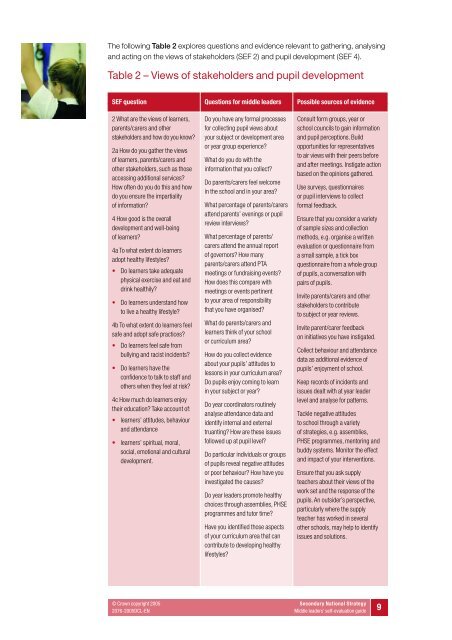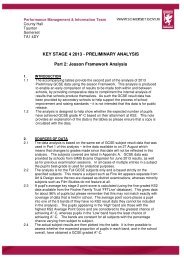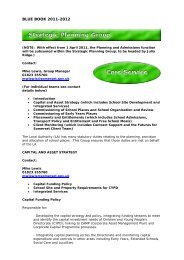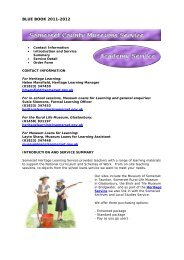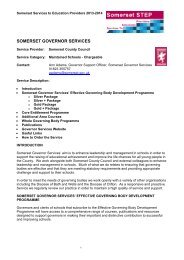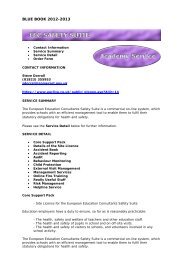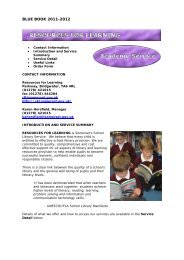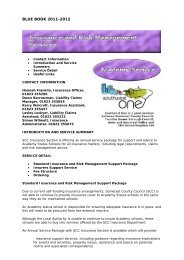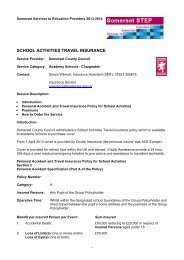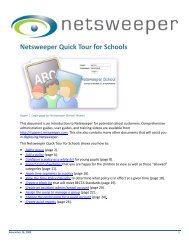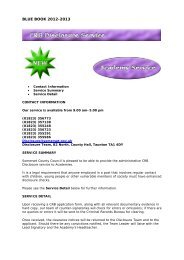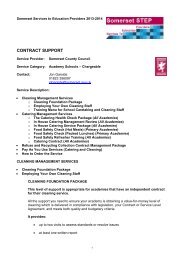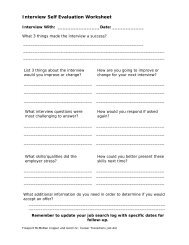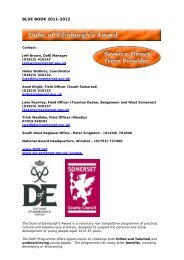Middle leaders' self-evaluation guide
Middle leaders' self-evaluation guide
Middle leaders' self-evaluation guide
Create successful ePaper yourself
Turn your PDF publications into a flip-book with our unique Google optimized e-Paper software.
The following Table 2 explores questions and evidence relevant to gathering, analysing<br />
and acting on the views of stakeholders (SEF 2) and pupil development (SEF 4).<br />
Table 2 – Views of stakeholders and pupil development<br />
SEF question Questions for middle leaders Possible sources of evidence<br />
2 What are the views of learners,<br />
parents/carers and other<br />
stakeholders and how do you know?<br />
2a How do you gather the views<br />
of learners, parents/carers and<br />
other stakeholders, such as those<br />
accessing additional services?<br />
How often do you do this and how<br />
do you ensure the impartiality<br />
of information?<br />
4 How good is the overall<br />
development and well-being<br />
of learners?<br />
4a To what extent do learners<br />
adopt healthy lifestyles?<br />
• Do learners take adequate<br />
physical exercise and eat and<br />
drink healthily?<br />
• Do learners understand how<br />
to live a healthy lifestyle?<br />
4b To what extent do learners feel<br />
safe and adopt safe practices?<br />
• Do learners feel safe from<br />
bullying and racist incidents?<br />
• Do learners have the<br />
confidence to talk to staff and<br />
others when they feel at risk?<br />
4c How much do learners enjoy<br />
their education? Take account of:<br />
• learners’ attitudes, behaviour<br />
and attendance<br />
• learners’ spiritual, moral,<br />
social, emotional and cultural<br />
development.<br />
Do you have any formal processes<br />
for collecting pupil views about<br />
your subject or development area<br />
or year group experience?<br />
What do you do with the<br />
information that you collect?<br />
Do parents/carers feel welcome<br />
in the school and in your area?<br />
What percentage of parents/carers<br />
attend parents’ evenings or pupil<br />
review interviews?<br />
What percentage of parents/<br />
carers attend the annual report<br />
of governors? How many<br />
parents/carers attend PTA<br />
meetings or fundraising events?<br />
How does this compare with<br />
meetings or events pertinent<br />
to your area of responsibility<br />
that you have organised?<br />
What do parents/carers and<br />
learners think of your school<br />
or curriculum area?<br />
How do you collect evidence<br />
about your pupils’ attitudes to<br />
lessons in your curriculum area?<br />
Do pupils enjoy coming to learn<br />
in your subject or year?<br />
Do year coordinators routinely<br />
analyse attendance data and<br />
identify internal and external<br />
truanting? How are these issues<br />
followed up at pupil level?<br />
Do particular individuals or groups<br />
of pupils reveal negative attitudes<br />
or poor behaviour? How have you<br />
investigated the causes?<br />
Do year leaders promote healthy<br />
choices through assemblies, PHSE<br />
programmes and tutor time?<br />
Have you identified those aspects<br />
of your curriculum area that can<br />
contribute to developing healthy<br />
lifestyles?<br />
Consult form groups, year or<br />
school councils to gain information<br />
and pupil perceptions. Build<br />
opportunities for representatives<br />
to air views with their peers before<br />
and after meetings. Instigate action<br />
based on the opinions gathered.<br />
Use surveys, questionnaires<br />
or pupil interviews to collect<br />
formal feedback.<br />
Ensure that you consider a variety<br />
of sample sizes and collection<br />
methods, e.g. organise a written<br />
<strong>evaluation</strong> or questionnaire from<br />
a small sample, a tick box<br />
questionnaire from a whole group<br />
of pupils, a conversation with<br />
pairs of pupils.<br />
Invite parents/carers and other<br />
stakeholders to contribute<br />
to subject or year reviews.<br />
Invite parent/carer feedback<br />
on initiatives you have instigated.<br />
Collect behaviour and attendance<br />
data as additional evidence of<br />
pupils’ enjoyment of school.<br />
Keep records of incidents and<br />
issues dealt with at year leader<br />
level and analyse for patterns.<br />
Tackle negative attitudes<br />
to school through a variety<br />
of strategies, e.g. assemblies,<br />
PHSE programmes, mentoring and<br />
buddy systems. Monitor the effect<br />
and impact of your interventions.<br />
Ensure that you ask supply<br />
teachers about their views of the<br />
work set and the response of the<br />
pupils.An outsider’s perspective,<br />
particularly where the supply<br />
teacher has worked in several<br />
other schools, may help to identify<br />
issues and solutions.<br />
© Crown copyright 2005 Secondary National Strategy<br />
2076-2005DCL-EN <strong>Middle</strong> leaders’ <strong>self</strong>-<strong>evaluation</strong> <strong>guide</strong> 9


